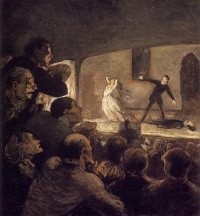Theatre
From The Art and Popular Culture Encyclopedia
| Revision as of 10:40, 22 December 2020 Jahsonic (Talk | contribs) ← Previous diff |
Revision as of 10:49, 22 December 2020 Jahsonic (Talk | contribs) Next diff → |
||
| Line 5: | Line 5: | ||
| "Although [[Theatre|theater]] is now a [[highbrow]] form, this was not so until the nineteenth century." --''[[Fringe and Fortune]]'' (1996) - Wesley Monroe, Jr., page 73 | "Although [[Theatre|theater]] is now a [[highbrow]] form, this was not so until the nineteenth century." --''[[Fringe and Fortune]]'' (1996) - Wesley Monroe, Jr., page 73 | ||
| <hr> | <hr> | ||
| - | “By the turn of the century, Shakespeare had been converted from a popular playwright whose dramas were the property of all those who flocked to see them, into a sacred author who had to be protected from ignorant audiences and overbearing actors threatening the integrity of his creations." --[[Lawrence Levine]] | + | “By the turn of the century, [[Shakespeare]] had been converted from a popular playwright whose dramas were the property of all those who flocked to see them, into a sacred author who had to be protected from ignorant audiences and overbearing actors threatening the integrity of his creations." --[[Lawrence W. Levine]] |
| |} | |} | ||
| [[Image:Melodrama by Daumier.jpg|thumb|200px|right|''[[At the Theater (The Melodrama)]]'' (c. [[1860]]-[[1864|64]]) - [[Honoré Daumier]]]] | [[Image:Melodrama by Daumier.jpg|thumb|200px|right|''[[At the Theater (The Melodrama)]]'' (c. [[1860]]-[[1864|64]]) - [[Honoré Daumier]]]] | ||
Revision as of 10:49, 22 December 2020
|
"Only animals who are below civilization and the angels who are beyond it can be sincere. Human beings are, necessarily, actors who cannot become something before they have first pretended to be it; and they can be divided, not into the hypocritical and the sincere, but into the sane who know they are acting and the mad do not." --The Age of Anxiety (1947) by W. H. Auden "Although theater is now a highbrow form, this was not so until the nineteenth century." --Fringe and Fortune (1996) - Wesley Monroe, Jr., page 73 “By the turn of the century, Shakespeare had been converted from a popular playwright whose dramas were the property of all those who flocked to see them, into a sacred author who had to be protected from ignorant audiences and overbearing actors threatening the integrity of his creations." --Lawrence W. Levine |

.png)
|
Related e |
|
Featured: |
Theatre (or theater) (from Greek "theatron", meaning "place of seeing") is the branch of the performing arts concerned with acting out stories in front of an audience using combinations of speech, gesture, mime, puppets, music, dance, sound and spectacle — indeed any one or more elements of the other performing arts. Theatre has been defined as what "occurs when one or more human beings, isolated in time and/or space, present themselves to another or others." Theatre is the second stage in the history of fiction.
Theatre makers
Late modern theatre
Late Modern, and especially twentieth century theatre, often continues the project of realism. However, there has also been a great deal of experimental theatre that rejects the conventions of realism and earlier forms. Examples include: Epic theatre, absurdist theatre, and postmodern theatre. Key figures of the century include: Luigi Pirandello, Bertolt Brecht, Antonin Artaud, Konstantin Stanislavski, Harold Pinter, Eugene O'Neill, Samuel Beckett, Dario Fo and Tony Kushner.
A number of aesthetic movements emerged in the 20th century, including:
See also
- History of fiction
- History of theatre
- Theatrical, which means fake and exaggerated.
- Drama
- Restoration spectacular, blockbuster avant la lettre
- Theatre of the Absurd
- Theatre of Cruelty
- Symbolist theatre


